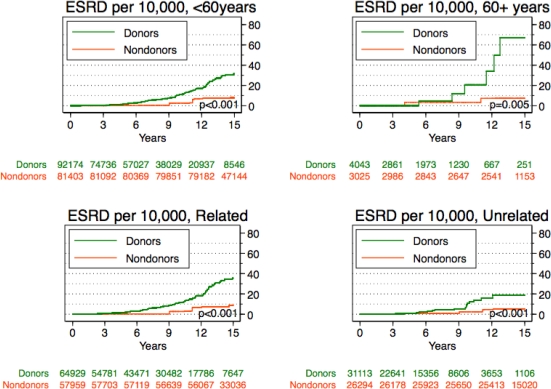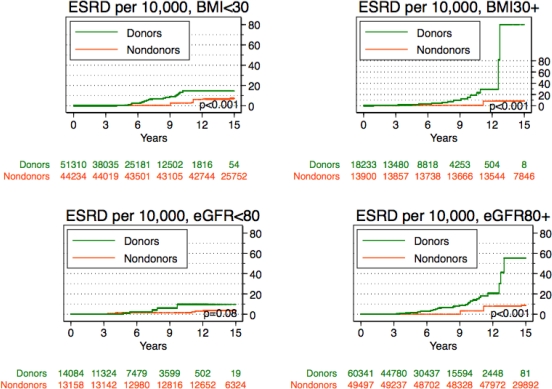Risk of ESRD Attributable to Live Kidney Donation in Various Subgroups of Donors
A. Muzaale, A. Massie, D. Segev.
Johns Hopkins University, Baltimore, MD.
Meeting: 2015 American Transplant Congress
Abstract number: 464
Keywords: Age factors, Donation, Donors, Obesity, unrelated
Session Information
Session Name: Concurrent Session: Kidney: Living Donor Issues III
Session Type: Concurrent Session
Date: Tuesday, May 5, 2015
Session Time: 4:00pm-5:30pm
 Presentation Time: 4:36pm-4:48pm
Presentation Time: 4:36pm-4:48pm
Location: Terrace I-III
Risk of ESRD attributable to live donation in male, older, obese, related donors, and donors with high predonation eGFR remains uncharacterized.
Methods: Various subgroups of individuals who donated a kidney between April 1994 and November 2011, and their healthy matched nondonor counterparts identified from NHANES III, were linked to CMS to ascertain the development of ESRD. Risk of ESRD attributable to donation was compared across these subgroups. Maximum follow-up was 15.0 years; median follow-up was 7.6 years (interquartile range [IQR], 3.9-11.5 years) for kidney donors and 15.0 years (IQR, 13.7-15.0 years) for matched healthy nondonors.
Results: Attributable risk of ESRD was substantially higher in male donors (31 per 10,000 male donors vs. 20 per 10,000 female donors), older donors (60 per 10,000 donors aged 60+ vs. 24 per 10,000 donors aged <60years), biologically related donors (27 per 10,000 related donors vs. 14 per 10,000 unrelated donors)(figure 1), obese donors (>80 per 10,000 donors with BMI 30+ vs. 8 per 10,000 donors with BMI <30), and donors with substantial renal reserve (47 per 10,000 donors with eGFR 80+ vs. 6 per 10,000 donors with eGFR <80)(figure 2). However, no substantial difference in attributable risk was observed across blood pressure subgroups (40 per 10,000 related donors vs. 38 per 10,000 donors with SBP<140).


Conclusions: Risk of ESRD attributable to live kidney donation is substantially higher in male, older, obese, related donors, and donors with predonation eGFR>80
To cite this abstract in AMA style:
Muzaale A, Massie A, Segev D. Risk of ESRD Attributable to Live Kidney Donation in Various Subgroups of Donors [abstract]. Am J Transplant. 2015; 15 (suppl 3). https://atcmeetingabstracts.com/abstract/risk-of-esrd-attributable-to-live-kidney-donation-in-various-subgroups-of-donors/. Accessed February 15, 2026.« Back to 2015 American Transplant Congress
